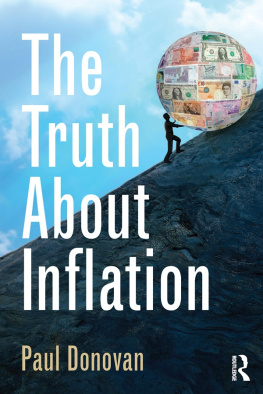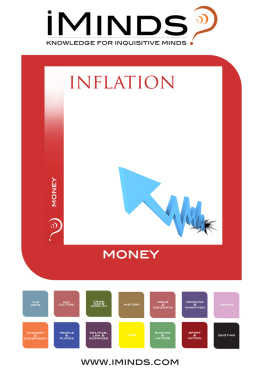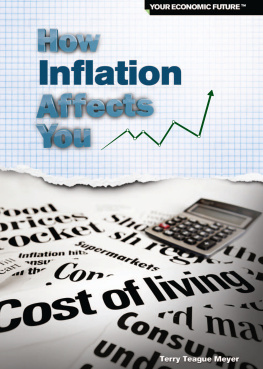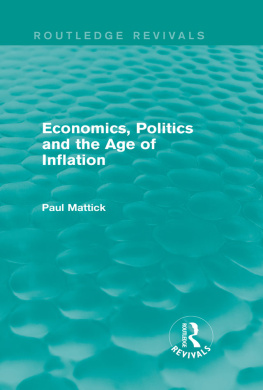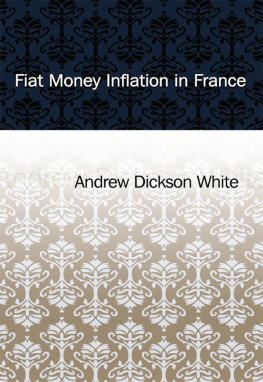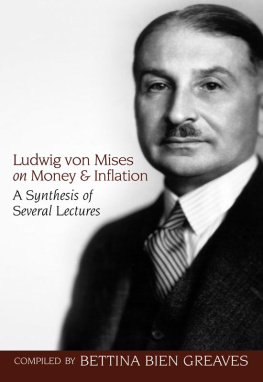Paul Donovan clearly demonstrates a critical issue for economic policy makers and investors. Even if inflation remains contained, specific groups in society will have a very different inflation experience from that portrayed by aggregate consumer price data. Understanding why and how inflation experiences differ from group to group will be increasingly important in creating a fairer society.
Right Honourable Danny Alexander MP,
Chief Secretary to the United Kingdom Treasury
Inflation is a topic that can become deeply embedded in a political culture, as Paul Donovan makes clear. Properly understanding the politics as well as the economics of inflation is critical to investment success.
Gerd W. Hintz, CIO Aequitas, Allianz Equity Advisors (Allianz Global Investors)
Unveils the ins and outs of inflation always with the investor and practitioner in mind. The authors sense of humour makes reading the book a real pleasure.
Bo Bejstrup Christensen, Head of Asset Allocation, Danske Capital
The Truth About Inflation
Inflation is a simple topic, in that the basic concepts are something that everyone can understand. However, inflation is not a simplistic topic. The composition of inflation and what the different inflation measures try to represent cannot be summarised with a single line on a chart or a casual reference to a solitary data point. Investors very often fail to understand the detail behind inflation, and end up making bad investment decisions as a result.
The Truth About Inflation does not set out to forecast inflation, but to help improve its understanding, so that investors can make better decisions to achieve the real returns that they need. Starting with a summary of the long history of inflation, the drivers of price change are considered. Many of the urban myths that have built up about inflation are shown to be a consequence of irrational judgement or political scaremongering. Some behaviour, like the unhealthy veneration of gold as a means of inflation protection, is shown to be the result of historical accident. In the modern era of lower nominal investment returns, inflation inequality (whereby some groups experience persistently higher inflation than others) is a very important consideration.
This book sets out the realities of price changes in the modern investing environment, without using economic equations or jargon. It gives investors the framework they need to think about inflation and how to protect themselves against it, whether the aggregate inflation of the future rises or falls from current levels.
Paul Donovan joined UBS in 1992 and is a managing director and global economist. Paul is responsible for formulating and presenting the UBS Investment Research global economic view.
The Truth About Inflation
Paul Donovan

First published 2015
by Routledge
2 Park Square, Milton Park, Abingdon, Oxon OX14 4RN
by Routledge
711 Third Avenue, New York, NY 10017
Routledge is an imprint of the Taylor &Francis Group, an informa business
2015 Paul Donovan
The right of Paul Donovan to be identified asauthor of this work has been asserted by him in accordance with the Copyright,Designs and Patent Act 1988.
All rights reserved. No part of this book maybe reprinted or reproduced or utilized in any form or by any electronic, mechanical, or other means, now known or hereafter invented, including photocopying and recording, or in any information storage or retrieval system, without permission in writing from the publishers.
Disclaimer: The opinions and statementsexpressed in this book are those of the author and are not necessarily the opinions of any other person, including UBS AG. UBS AG and its affiliates accept no liability whatsoever for any statements or opinions contained in this book, or for the consequences which may result from any person relying on such opinions or statements.
Trademark notice: Product orcorporate names may be trademarks or registered trademarks, and are used only for identification and explanation without intent to infringe.
British Library Cataloguing in Publication Data
A catalogue record for this book is available from the British Library
Library of Congress Cataloging in Publication Data
Donovan, Paul, 1972
The truth about inflation/ Paul Donovan.
pages cm
1. Inflation (Finance) I. Title.
HG229.D636 2015
332.41dc23 2014041863
ISBN: 978-1-138-02361-1 (hbk)
ISBN: 978-1-315-77629-3 (ebk)
Typeset in Times New Roman
by HWA Text and Data Management, London
To my father, Roy Donovan, who gave me my first economics book and who bore the spiralling cost inflation of supporting a son who wanted to be the economist, with remarkably little complaint.
Consider this the real return on your investment, Dad.
Contents
Figures
Tables
Boxes
I have long wanted to write a book on inflation; economists tend to have the strangest desires. Several things provoked my interest in the topic. Perhaps being a child of the 1970s, and British to boot, has meant that inflation is something always lurking in the background of my subconscious. Even as a child I was aware that prices changed. I can remember the creeping cost of the mid-morning milk-and-biscuit at school, and the point at which the two pence coin that had previously bought me a chocolate biscuit on a Friday was no longer sufficient, creating an early and powerful form of the loss aversion theory that pervades this book. (Believe me, the loss of that chocolate biscuit was very, very keenly felt. Do not let anyone tell you that a small piece of shortbread is an adequate substitute.)
More recently, sitting on the investment committee of St Annes College, Oxford, has made me very aware of the problems of relying on headline inflation as a generic statistic. The inflation in costs faced by the college bears little relation to the headline UK consumer price index for much of the time, and the investment committee spends a great deal of effort trying to overcome the differences. The discussions of my colleagues on the committee, who have a truly frightening depth of experience and wisdom, have always proved a source of stimulation for my work. I always feel my membership of the committee is fraudulent, for I take away infinitely more than I contribute to the committee meetings. Though it will not compensate for everything St Annes has given me over the years, the royalties from this book are being donated to the college.
Working at UBS Investment Bank has also been a huge source of intellectual stimulus. Over two decades of discussions with colleagues have led to countless instances where my views have been corrected, adjusted and polished. Larry Hatheway, chief economist of UBS, deserves special mention as heading a department that not only allows economists to pursue their own projects, but provides an environment in whichproper discussion and constructive criticism can take place. George Magnus, Larrys immediate predecessor, set that environment in place and it has been a privilege to be able to argue repeatedly with George on a wide range of economic (and other) issues over the years. The views of other current and former colleagues have been very helpful: whether wittingly or unwittingly provided, I must acknowledge a real debt to Maury Harris, Reinhard Cluse, Tao Wang, Duncan Wooldridge, Scott Haslem, Andy Cates, Jeff Palma, Erika Karp and Justin Knight.
Other colleagues very kindly gave up their time to read and check various chapters. Edel Tully, one of the most experienced minds on the topic of precious metals, very kindly looked over the chapter on gold. Ramin Nakisa, an accomplished author on financial assets, took time from his more cerebral reading to look over the chapter on inflation history.
Next page
